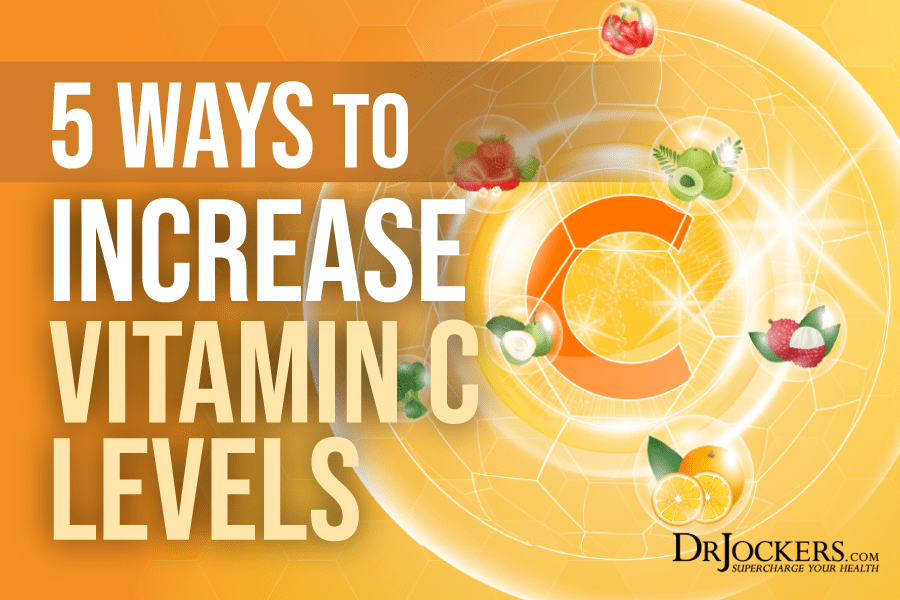
5 Ways to Increase Your Vitamin C Levels
Vitamin C is made naturally in almost all living animals except humans, primates, and guinea pigs. Dogs and cats produce their own vitamin C from ingested food that has been metabolized into glucose. This mechanism keeps their vitamin C levels up without consuming food rich in vitamin C.
Humans must consume vitamin C from their food sources, or they risk severe health problems. There is an intimate relationship between glucose and vitamin C that has a dramatic impact on immunity and overall cellular health. In this article, you will discover 5 keys to increasing your vitamin C levels.
Most animals and plants are able to synthesize their own vitamin C. This is done through a biochemical pathway that depends on 4 key enzymes that convert glucose to vitamin C. In mammals, glucose is extracted from stored sugar (glycogen), and the transformation into vitamin C is produced in the liver (1, 2).
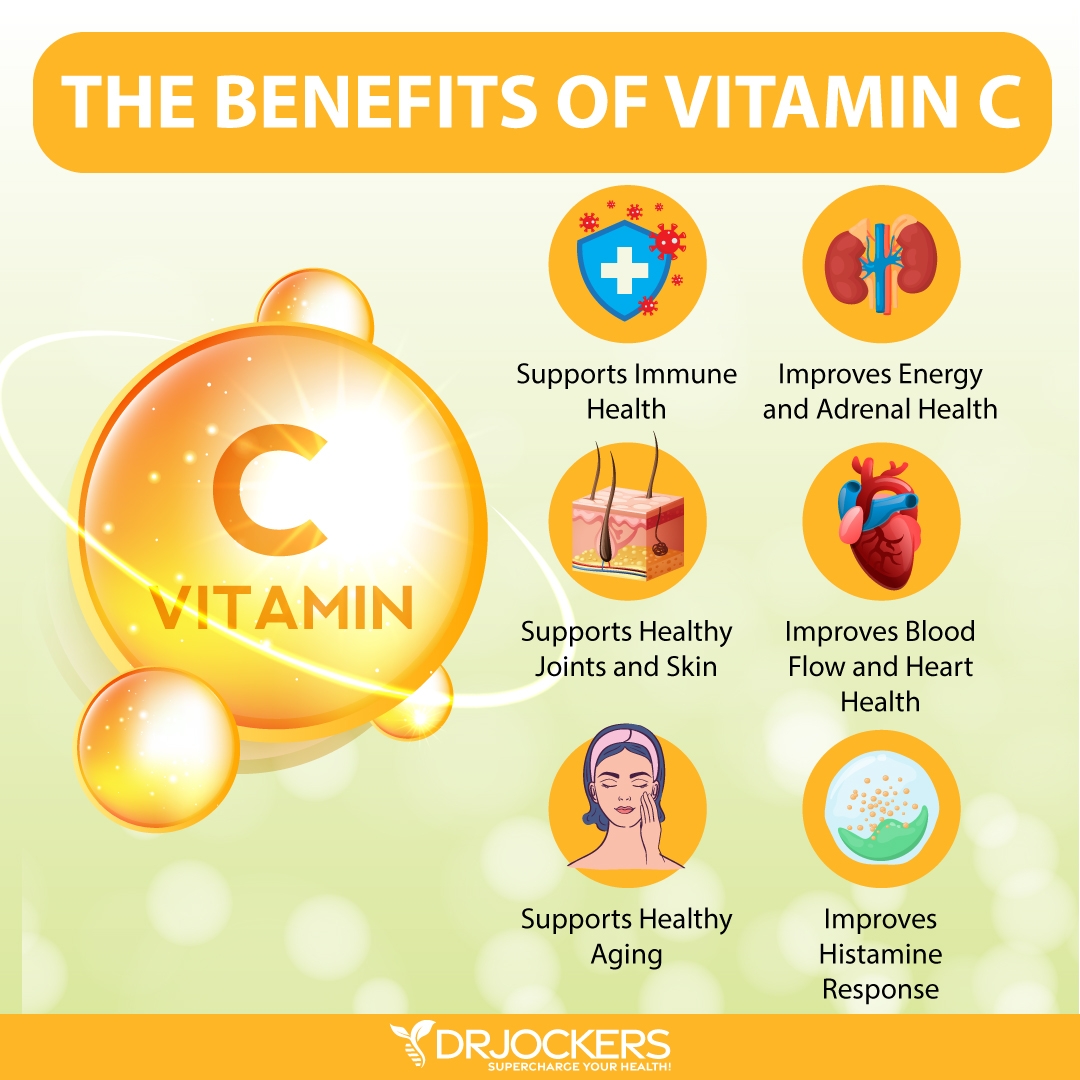
Glutathione Recycles Vitamin C
Humans lack the L-gulonolactone oxidase enzyme that is critical for the last step of vitamin C synthesis. Humans require a good amount of vitamin C to build healthy tissue collagen and promote strong immune function (3, 4).
When vitamin C levels are low, the body recycles the oxidized version of vitamin C. This redox cycling is performed by the master antioxidant glutathione. As long as enough glutathione is present, the vitamin C redox cycle can continue (5).
The Nobel Prize winning chemist Linus Pauling discovered that white blood cells need very high doses of vitamin C to function effectively. In the late 1960’s, he developed the understanding of using high dose vitamin C to combat the common cold. This technique has worked effectively for many individuals; however, there is more to the story when it comes to vitamin C (6).
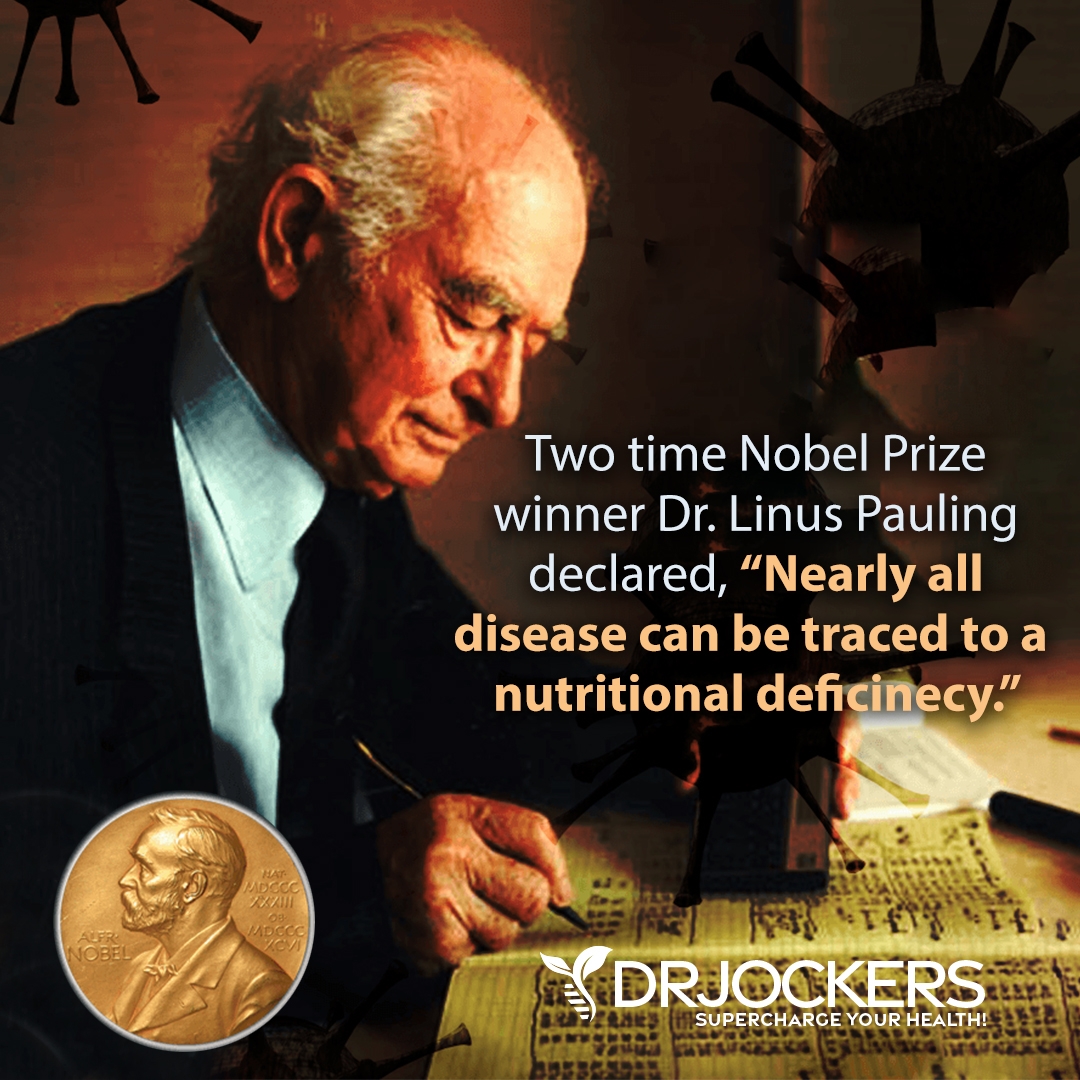
The GAA Theory
In the 1970’s, Dr. John Ely discovered the Glucose-Ascorbate-Antagonism (GAA) theory. Glucose and vitamin C (ascorbate) have a very similar chemical makeup. This theory proposes that elevated glucose levels compete and effectively restrict vitamin C from entering cells. Both glucose and vitamin C depend upon the pancreatic hormone insulin and its signaling effects to get into cells (7).
An important protein transporter, the GLUT-1, activates in response to insulin interacting with the insulin receptor allowing both glucose and vitamin C to enter the cell. However, glucose has a greater affinity for the insulin receptor. This means that the greater the content of circulating blood sugar the less vitamin C will enter the cell (8, 9).

White Blood Cells and Insulin Pumps
White blood cells have more insulin pumps than any other type of cell and may contain 20 times the amount of vitamin C as other cells. They also need 50 times more vitamin C inside the cell than in the blood plasma in order to handle the oxidative stress that occurs when they encounter a pathogenic substance (10, 11).
When white blood cells encounter pathogenic bacteria and viruses, they must ingest or phagocytize these organisms in order to neutralize them. The phagocytic index measures how effective a particular white blood cell is at destroying viruses, bacteria, and cancer cells. Elevated blood sugar impairs this phagocytic index. In fact, a blood sugar of 120 reduces the phagocytic index by 75% (12).
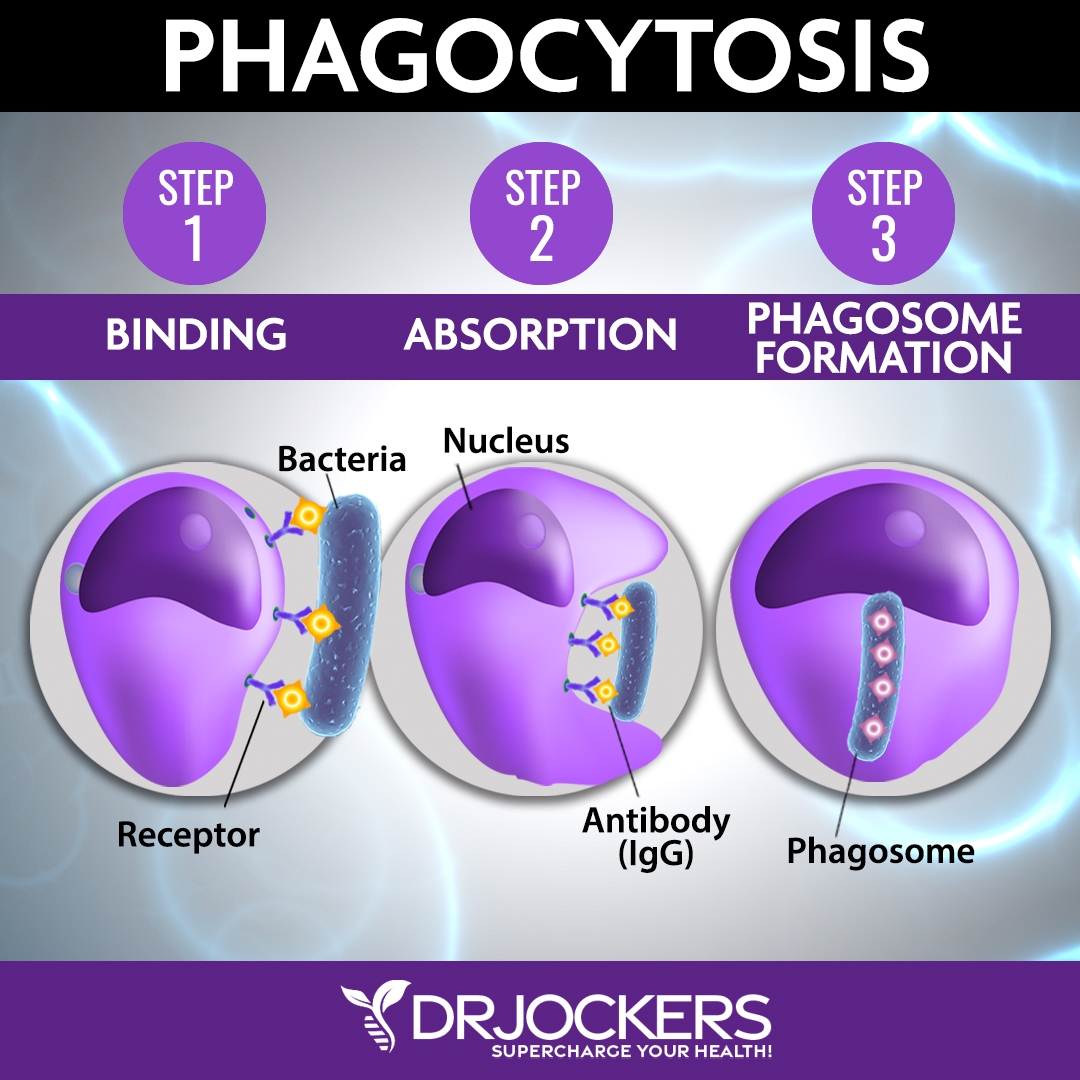
Vitamin C and the HMP Shunt
Glucose and ascorbic acid also work on the hexose monophosphate (HMP) shunt. The HMP is a biochemical pathway that produces NADPH. White blood cells need NADPH to create superoxide and other reactive oxygen species that oxidize and destroy pathogens (13).
Vitamin C not only helps produce NADPH but also regulates quantities so the white blood cell does not create too much oxidative stress in its attempt to protect the body.
Vitamin C activates this important shunt while glucose inhibits it. This HMP shunt also produces ribose and deoxyribose which provide important raw materials for the formation of new white blood cell RNA/DNA (14).
When the immune system is under attack, it needs to quickly produce new immune cells. If blood sugar is high enough to turn off the HMP shunt, it will reduce the quantity of RNA/DNA and the amount of new immune cells formed.
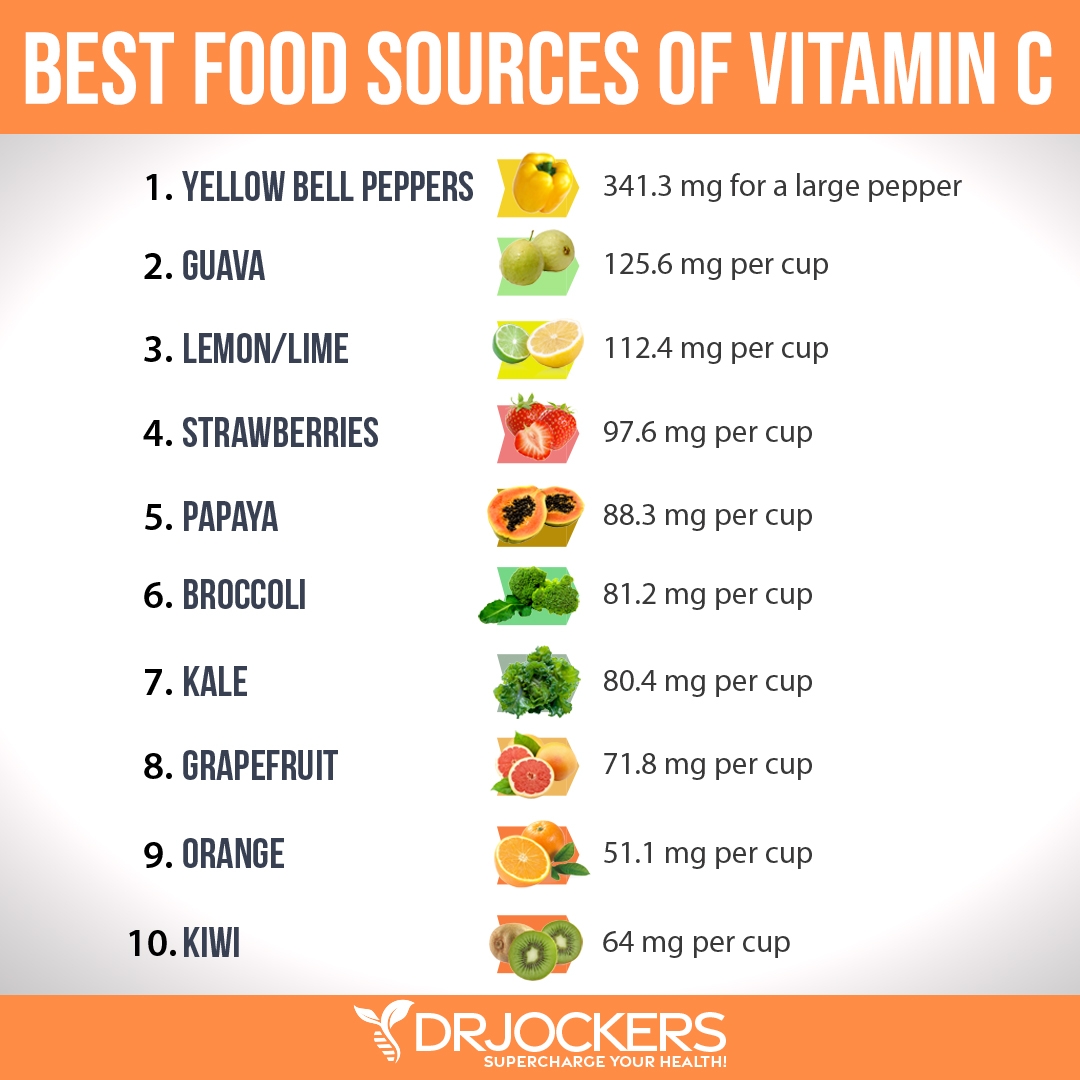
Best Food Sources of Vitamin C:
The current adult RDA for vitamin C is 60 mg; however, as a practicing clinician, I recommend my clients get at least 200 mg from food and ideally supplement with another 500mg -1 gram daily. In cases of chronic health conditions, I will recommend much higher dosages.
Here are the best food sources to consume to boost your vitamin C levels. Eating some of these on a daily basis is recommended. If you are doing a fast and not consuming food, I wouldn’t worry about it as your body will not have as great a need for vitamin C during the fast. But when you return to consuming food, be sure to include these vitamin C rich foods.
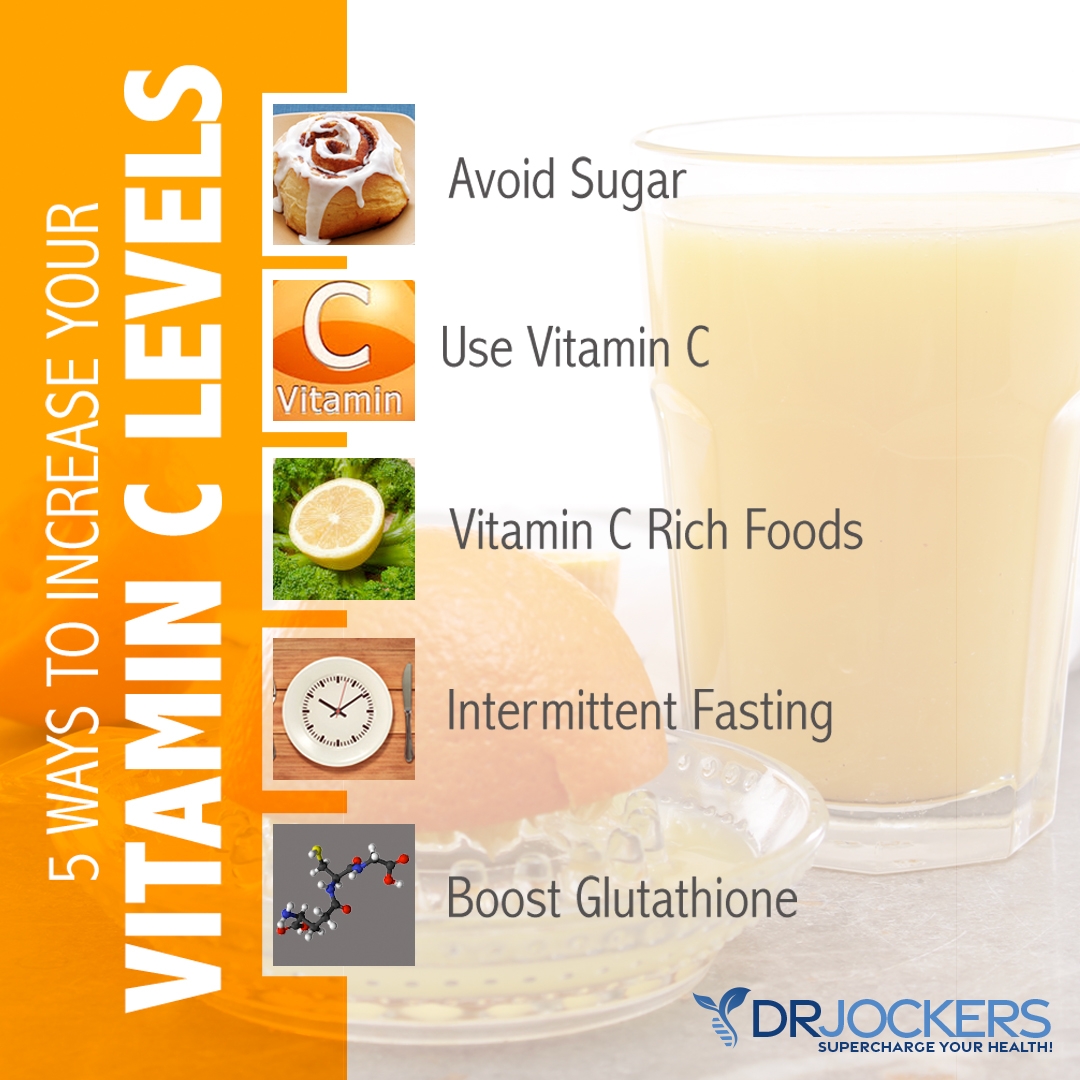
5 Ways to Increase Your Vitamin C Levels
Vitamin C is obviously extremely important for our overall health, and there are 5 key things you can do to improve your levels.
Avoid Sugar:
Avoid sugar as much as possible and stick to a lower carbohydrate diet to improve your vitamin C levels. This includes processed sugars but also high starch foods such as potatoes, rice, high sugar fruits like bananas, watermelon, etc.
I recommend following a lower carbohydrate diet that is rich in non-starchy vegetables such as broccoli, cauliflower, kale, celery, asparagus, garlic, onions, mushrooms, cucumbers, etc. Consume grass-fed and organic animal products and lots of healthy fats from avocados, olives, olive oil, and coconut oil. These foods will stabilize your blood sugar and insulin and improve your immune health.
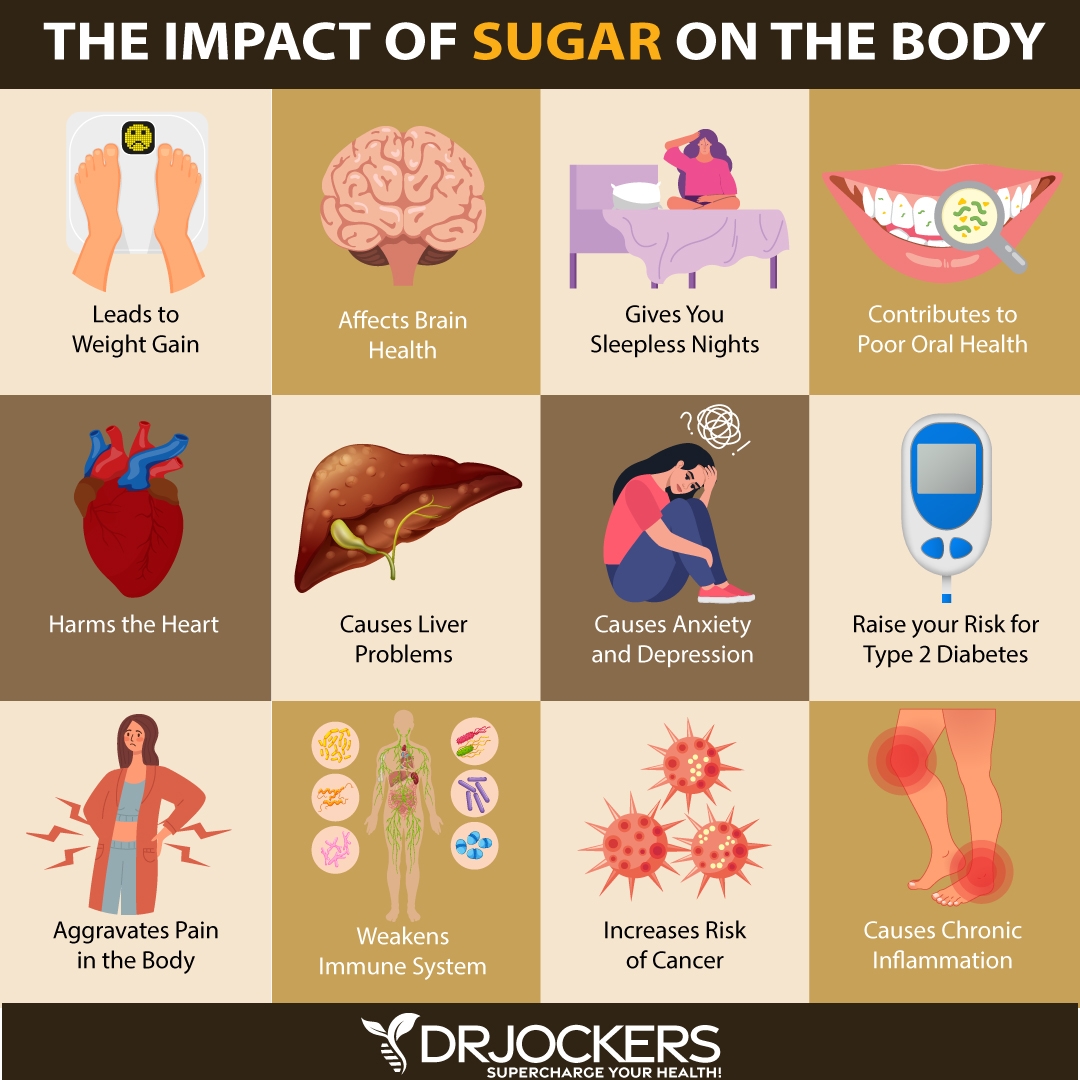
Vitamin C Rich Foods:
Use low sugar whole food forms of vitamin C such as bell peppers, broccoli, lemon, lime, & green leafy veggies as much as possible to support your vitamin C levels. These food sources should be included in most of your meals. You can also drink warm lemon water, which not only provides vitamin C but is also a great support for healthy digestion.
You can also add in foods that are rich in quercetin which is a bioflavonoid that works in tandem with vitamin C to support the immune system. This would include onions, elderberries, cranberries, peppers, and kale.
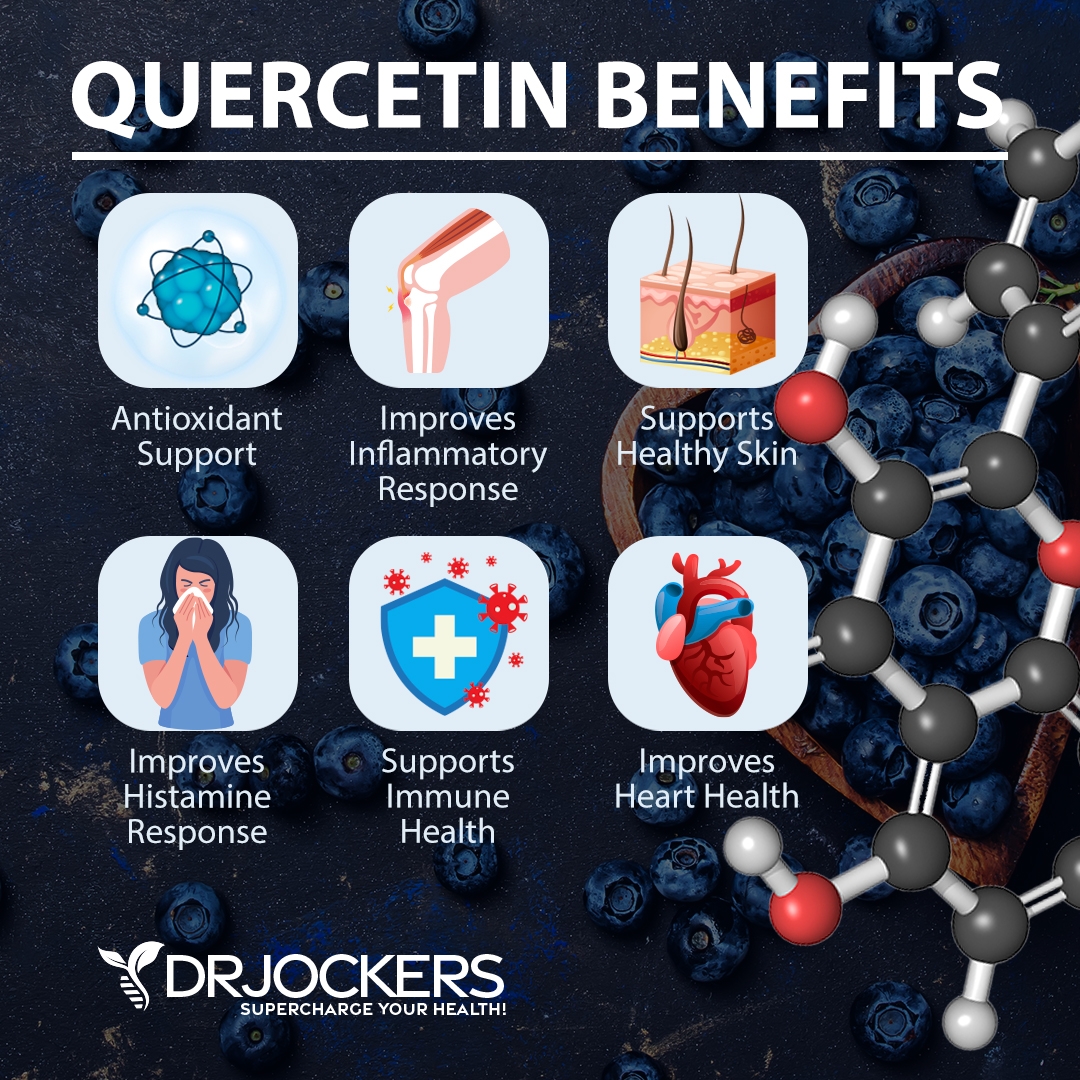
Use Vitamin C Supplements:
Vitamin C is an important component in controlling inflammatory responses to damaged tissues. Vitamin C also acts as an anti-histamine and helps to control hyperinflammatory responses to infections and allergies (15, 16, 17).
I recommend our Super C, which has a 1:1 ratio of vitamin C to citrus bioflavonoids, which are also called vitamin P. This combination of vitamin C and vitamin P synergizes to uniquely improve immunity and support adrenal health. This synergy helps to improve capillary permeability to deliver more oxygen to cells. I personally use 1 gram (2 caps) in the morning upon rising and 1 gram at night before bed to support my adrenal health, circulation, and immune system function.
Intermittent Fasting:
Combining intermittent fasting with vitamin C supplementation and lemon water can be of great benefit for improving blood sugar regulation and immunity. Fasting will improve your blood sugar levels and take the stress off of your digestive system, which frees up more energy for immune function, healing, and repair.
Intermittent fasting is a strategy that involves fasting (not eating) for a period of time followed by a period of feasting (eating). Intermittent fasting increases autophagy, cellular rejuvenation, immune system function, and genetic repair. It reduces inflammation and the risk of disease. For more info on how to practice intermittent fasting, read this article.
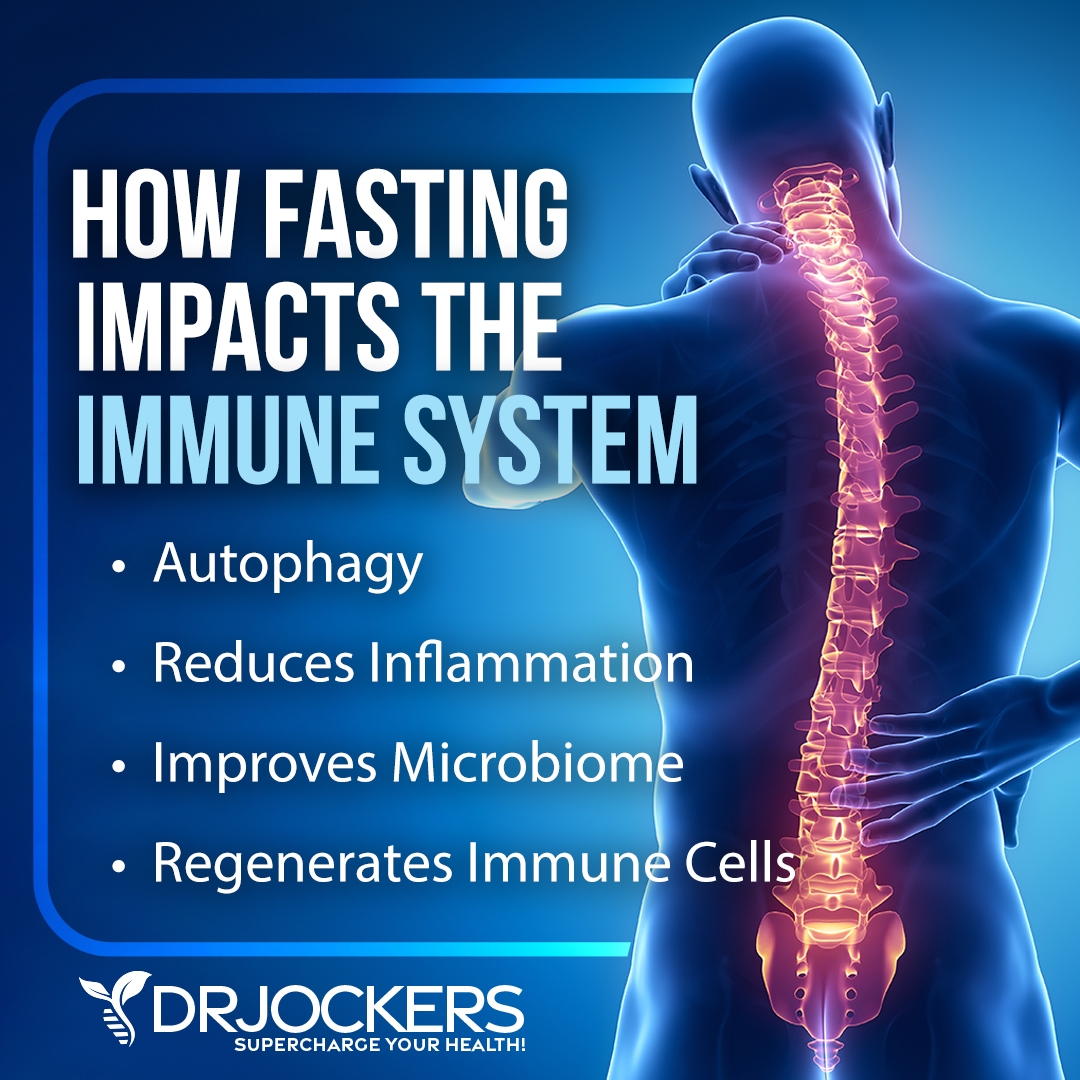
Boost Glutathione:
Glutathione, commonly referred to as “the master antioxidant,” is a powerful force for our immune health. It helps to improve the inflammatory response and has the essential role of maintaining exogenous antioxidants such as vitamins C and E in their active form. Glutathione protects cells from free radicals and repairs free radical damage that does occur.
Many people are deficient in glutathione and may benefit from supplementation. For supplemental forms, look for reduced glutathione, acetylated glutathione, and liposomal forms of glutathione. Additionally, precursors like N-Acetyl Cysteine (NAC) help the body to produce glutathione. Discuss dosages with your healthcare practitioner.
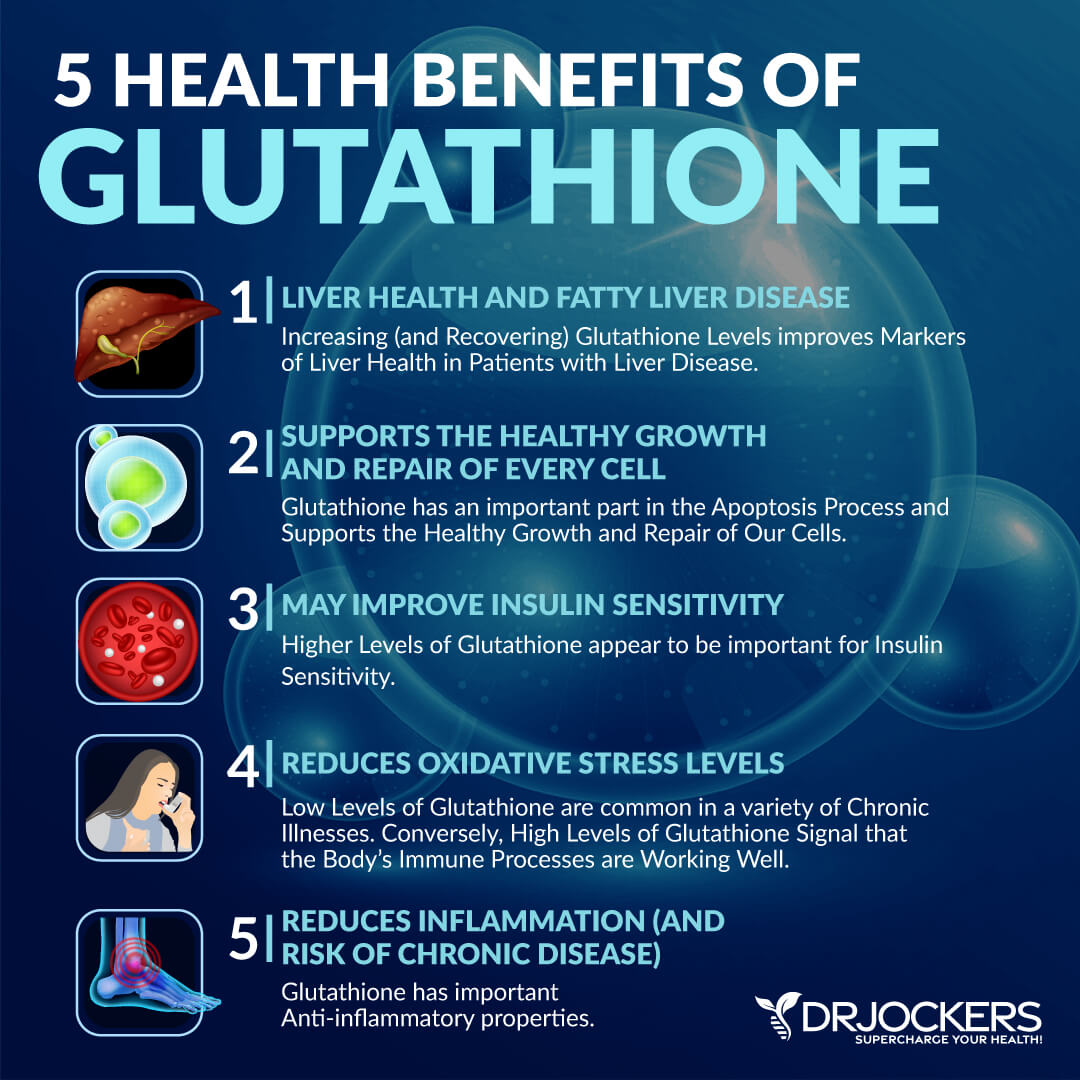
Glutathione Supplements
I have many of my clients boost their glutathione levels through natural strategies and key supplements such as Super Glutathione. Glutathione helps to recycle vitamin C, and it may be more important as a supplement than vitamin C, although vitamin C can be of great benefit.
For optimal glutathione absorption and utilization within the cell, you want to use an acetylated form of glutathione that bypasses the gut and is easily absorbed into the cell. This is the form used in Super Glutathione. You can also use liposomal glutathione, which also bypasses the gut and fuses into the cell membranes for optimal absorption.
If you want to work with a functional health coach, I recommend this article with tips on how to find a great coach. We do offer long-distance functional health coaching programs with our world class team of health coaches. For further support with your health goals, just reach out and our fantastic coaches are here to support your journey.
Inflammation Crushing Ebundle
The Inflammation Crushing Ebundle is designed to help you improve your brain, liver, immune system and discover the healing strategies, foods and recipes to burn fat, reduce inflammation and Thrive in Life!
As a doctor of natural medicine, I have spent the past 20 years studying the best healing strategies and worked with hundreds of coaching clients, helping them overcome chronic health conditions and optimize their overall health.
In our Inflammation Crushing Ebundle, I have put together my very best strategies to reduce inflammation and optimize your healing potential. Take a look at what you will get inside these valuable guides below!







I read your “helpful article” and was wondering if you knew how much more Vitamin C is absorbed by including bioflavonoids with vitamin C and more importantly, for a type 2 diabetic why you would not suggest maybe 10 times more Vitamin C that you recommend in your article,since perhaps only 30% is absorbed since the cells prefer glucose instead?
Let me know.
Thanks,
Richard Iacino
Richard, bioflavonoids do not improve Vitamin C absorption. No evidence demonstrates this. But there are studies that the two may be synergistic in supporting the immune and circulatory systems.
I read somewhere that including bioflavonoids kept the vitamin C around for longer. Sorry don’t have the reference handy.
Does taking glutathione supplement take away or decrease a body’s ability to produce it? You are supplementing so it stops producing since it is being supplied or will body continue to produce? If u stop supplements with u be at a greater deficit?
Good question Liss, this is a common concern. If done for long-term, it is possible that your body will lower endogenous production. The key is to cycle. Something like 5 days on, 2 days off or even 2-3 weeks on, 1 week off would be a good strategy!
Why would someone take glutathione if the body makes it.
And how do you test for that
A number of factors like your exposure to certain chemicals, chronic infection, nutrition, etc. can inhibit or deplete glutathione stores faster than they can replenish. This makes supplementation helpful in certain situations! Something like an organic acids test or a micronutrient analysis could give you insight into this! Both can be found here: https://drjockers.com/lab-testing/
Glutathione is important in removing brain fog and neuroinflammation after brain injury or severe concussion. Some genes turn from on to off (epigenetics) after a trauma like a brain injury. Also, some people have genetic issues with detoxification and need extra support with NAC or/and L-glutathione. Dr. Jockers have you thought of becoming a Chiropractic Neurologist (DACNB) or Functional Neurologist or have you taken the Neuro Chemistry and Nutrition course offered by the Carrick Institute?
We planted 3 acerola cherry shrubs in our yard for the vit C content. It’s something like 50x the c content of oranges but it’s a hot weather fruit and is usually only found powdered. We also consume a lot of red onions and use the outer peels as an ingredient for homemade dressing in a food processor.
Just take NAC N-Acetyl-L-Cysteine .It helps your body produce more glutathione
What about Camu powder? Isn’t it touted as 73X more Vitamin C than Oranges?
That is another good source Mary!
Hello, Dr. David Jockers. My body loves when I take either supplement or food high in Vitamin C. However I passed calcium oxalate kidney stones three times & Vitamin C is promoting it (same as for my late father). Any suggestions?
Thank you for your time. Leon
Hi Leon, here’s my 2¢ worth. Limit supplementation to ½ gram of true vitamin-c/d. With Dysbiosis you don’t have the normal gut bacteria that metabolize the oxalic acids, thus your hyperoxaluria has also overrode sulfation. Since many excellent foods also have oxalates, you can address those issues by consuming some magnesium citrate with each meal assuming that your kidneys are otherwise healthy.
Your remark about vitamin-c promoting kidney stones is misleading. It would be the same if I said that fire wood is promoting fires. The problem is the damage to your gut microbiome, which is usually the result of taking antibiotics. Your don’t get calcium oxalate kidney stones from vitamin-c, you get them from Dysbiosis. And you normally get Dysbiosis from taking antibiotics.
Great suggestions Louise! Be Blessed!
Hello, Louise; Thank you for your detail explanation. Because my late father passed kidneys stones many times in his life, I think not only Dysbiosis but genetic weakness plays role as well. Best wishes. Leon
hi how much magnesium nitrate? to take after meals is that every meal?
Yes be sure to go on a low oxalate diet. Read this article: https://drjockers.com/12-steps-prevent-kidney-stones/
Hello, Dr. David Jockers. Thank you for your reply.
Hi Leon, if you’re interested in the genetic aspects of oxalates, you should consider the Organic Acid Test (OAT), which is offered by Dr. Jockers. It tests for two different genetic oxalic markers plus your urine concentration. Whereas, Dysbiosis will usually consist of a fungal overgrowth (also on the OAT), a low or absent Oxalobacter formigenes count, plus other idiosyncrasies, which can elevate oxalates. Your concern should not be limited to the kidney stones and it would be wise to seek professional guidance. Note also that with oxalates the genetics may only be an issue subsequent to Dysbiosis.
Dr. Jockers: Don’t stomach acid and digestive enzymes render oral glutathione useless unless it is presented in the liposomal state or as NAC which is one of the three amino acid precursors?
Hey Steve, That is correct. Most oral doses are oxidized before it can be absorbed. Oral S-Acetyl Glutathione is well researched to be stable and increases total glutathione. This is what I use in my formula of Super Glutathione here: https://drjockers.com/increase-vitamin-c-levels/
I believe a high level of glutathione is also formed from coffee enemas.
i have also found from other sources that both leafy vegetables can be combined with fruits listed for higher content of vitamin c that can also help absorb iron (spinach and strawberries).
Yes thanks for sharing!
Hello…would you consider 1gr (1000mg) of time release vitamin C adequate for adrenal fatigue?
Thanx!
Yes that should be enough but in some cases the individual may need more!
“Of equal importance was the recognition about twenty years ago that the optimum intakes of several of the vitamins, far larger than the usually recommended intakes, lead to further improvement in health, greater protection against many diseases, and great value as an adjunct to the appropriate conventional therapy in the treatment of diseases.”
“Limit your mineral intake to the recommended amounts.”
Dr. Linus Pauling — HOW TO LIVE LONGER AND FEEL BETTER. (1986, p 11 f.)
WOW !!!!! all this great info and it’s FREE !!!!!! thank you dr locker
Thanks Paidro! Blessings to you!
Dr. Jockers,
I find your articles on various health reviews very helpful because you write them so clearly and also include scientific basis. If possible, could you please write a review on Alzheimer’s disease and proven over-the-counter products?
Thank you and yes we have a very good article for you here: https://drjockers.com/alzheimers-disease/
I was told that all Vitamin C was fermented and therefore unacceptable for use by people having Mast cell/high oxalate/histamine issues. Camu camu and a vitamin C by Metabolic Maintenance were the only ones acceptable. Dr. Jockers, do you have anything to suggest that might be helpful in addition to those, except for foods, many of which are not on the diets of those with the above issues?
I recommend a Quercetin with vitamin C for histamine/MCAS. Here is a helpful article: https://drjockers.com/mast-cell-activation-syndrome/
Awesome articles Dr. Jockers! Can I ask what your Vitamin C is derived from? Allergic to corn and heard that some Vitamin C is derived from corn. Looking at purchasing your Super C Powder and wanted to make sure it wouldn’t bother me.
Thanks in advance!
Yes this is derived from non-GMO corn. But you can get the Paleovalley vitamin C here which is whole food and non-corn based. Use the coupon code JOCKERS at checkout to save 15% https://paleovalley.com/store/essential-c-complex
There is now evidence that too much synthetic Vitamin C (even only 500mg/day – see below) can have negative effects on the body, but food Vitamin C is fine in any amount. Would you recommend sticking to 200mg/day of synthetic maximum and getting the rest from food sources? I did see a study showing that this dose is effective for antioxidant effects. Thanks.
“A second study presented to the American Heart Association showed a link between consumption of only 500 mg of vitamin C per day and a greater propensity toward thickening of the arteries (Los Angeles Times, March 3, 2000). More recently, athletes taking 1000 mg of isolated ascorbic acid per day showed reduced endurance capacity from interference with antioxidant enzymes (American Journal of Clinical Nutrition, Jan 2008).” https://www.thehealthyhomeeconomist.com/beware-of-ascorbic-acid-synthetic/
What does a person do who has bladder sensitivity and cannot tolerate high doses of supplemental vitamin C, yet also has anxiety and depression issues and needs the high doses of C?
I would focus on magnesium, probiotics and omega 3 fats. Here is a helpful article: https://drjockers.com/mood-swings-emotional-support/
Dr. Jockers, I find your reply/response to D’s question a “little” short or could be termed “wanting”! Is there a reason for this?
Dr Jockers – just wondering about the different forms of Vit. C – e.g ascorbic acid, ascorbate etc. is ascorbic acid the way to go?
What about calcification? I have it in my eye and consultant removes it every 3 months. Any ideas to prevent this?
Hello Anne – yes vitamin K2 can be very helpful for this: https://drjockers.com/vitamin-k2/
Sally Fallon says raw milk provides plenty of glutathione!
Yes it provides key amino acids that support glutathione production.
I find your articles very helpful They are clearly written and illustrated. Thank you for all the guidance you offer. Most Vitamin C supplements are Ascorbic Acid based and put my oral mucosa into ulceration overdrive. (Oral Lichen Planus). What do you recommend for folks who cannot tolerate Ascorbic Acid?
I cannot stand ascorbic acid (stomach will complain!!!), so I take a little sodium ascorbate with some camu camu, acerola and NAC (since my Dutch Test showed very low glutathione).
Hello Dr. Jockers, Thanks for giving a lot of information on the importance of Vitamin C uptake and its functioning in the cell metabolism. After reading this I will definitely add Vitamin C foods daily in my diet.
Thank you Dr Jockers@, you are God sent. I have been recently diagnosed with low white cells and was put on vitamin C 1000mg for 6months. Is this enough and what is your advise? I am worried about my immunity and health.
No that is way too low. I would recommend 2 grams – 5x daily.
Hi, can somebody, who has metastatik lung cancer treated with Osimertinib, a Kind of targeted drug, take glutathione?
Thanks.
For any sort of drug related questions, it is always advisable to discuss with your physician. Blessings!
Another really fantastic and educative article by Dr Jockers gifting “the ordinary person who doesn’t read the latest medical and scientific journals” with really life empowering information. Thanks Dr J.
Thanks so much for all your support!
Hi,
I just bought microingredients organic acerola extract powder and taking this 1-2 times a day to increase my vitamin c. Your thoughts?
Sauerkraut has Vit C?
Hi Dr. Jockers. I have a question regarding the type of vitamin C and which do you recommend when dealing with histamine intolerance? And issues with using a lot of citric acid/ acidic fruits. I read that magnesium ascorbate was a good one ? What are your studies? Thank you